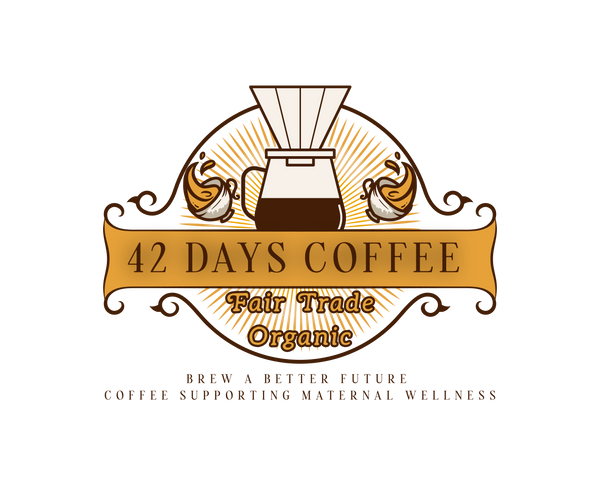
Organic Coffee Health Benefits | Low-Acid & Fair Trade
Share
Your morning cup of coffee should energize you, not expose you to harmful chemicals. Yet most coffee drinkers have no idea what's lurking in their daily brew. The difference between conventional commodity coffee and organic coffee isn't just about taste—it's about your health, the environment, and supporting sustainable farming practices.

The Hidden Dangers in Conventional Coffee
Coffee ranks among the most heavily sprayed crops in the world. Conventional commodity coffee production relies on a cocktail of synthetic pesticides, herbicides, and fungicides that would alarm most health-conscious consumers if they knew the full extent.
Pesticides Commonly Used on Non-Organic Coffee
Commercial coffee farms frequently apply chemicals that include:
- Chlorpyrifos: A neurotoxic insecticide linked to developmental issues in children and banned for residential use in many countries
- Glyphosate: The controversial herbicide found in Roundup, classified as a probable carcinogen by international health organizations
- Endosulfan: A toxic pesticide banned in over 80 countries but still used in some coffee-producing regions
- Cypermethrin and Deltamethrin: Synthetic pyrethroids that can disrupt the endocrine system
- Triadimefon: A fungicide with potential reproductive toxicit
These chemicals don't simply disappear after harvest. Residues remain on the coffee beans through processing, roasting, and brewing—ultimately ending up in your morning cup. Studies have detected pesticide residues in commercially available coffee, raising concerns about cumulative exposure from daily consumption.
Beyond direct health impacts, conventional coffee farming devastates ecosystems. Chemical runoff pollutes waterways, destroys beneficial insects, and degrades soil quality. Farmworkers face dangerous exposure levels, leading to serious health complications in coffee-growing communities worldwide.
What Makes Organic Coffee Different
Organic coffee represents a fundamental shift in how coffee is grown, processed, and brought to your table. But "organic" isn't just a marketing term—it's a rigorous certification process with strict standards.
Understanding Organic Certification
To earn organic certification, coffee farms must meet comprehensive requirements:
USDA Organic Certification mandates that coffee be grown without synthetic pesticides, herbicides, or fertilizers for at least three years before harvest. Farms must demonstrate soil health through composting and natural fertilization methods. They must implement pest control through natural predators, crop rotation, and biodiversity rather than chemical sprays.
International Organic Standards from bodies like the European Union and various countries impose similar restrictions, ensuring that organic coffee meets global standards regardless of origin
The certification process involves:
- Annual inspections by accredited third-party certifiers
- Detailed record-keeping of all farming practices
- Buffer zones between organic fields and conventional farms to prevent contamination
- Strict post-harvest handling to maintain organic integrity
- Regular soil and water testing
Fair Trade Coffee: Ethics in Every Sip
Many organic coffees also carry Fair Trade certification, which addresses the human element of coffee production. Fair Trade Coffee ensures that farmers receive fair compensation for their harvest—typically well above commodity market prices. This certification guarantees safe working conditions, prohibits child labor, and promotes community development in coffee-growing regions.
When you choose Fair Trade organic coffee, you're supporting:
- Direct relationships between roasters and farming communities
- Investment in education and healthcare in rural areas
- Environmental stewardship and sustainable farming techniques
- Economic stability for small-scale farmers who might otherwise be exploited by middlemen
The Antioxidant Advantage
Organic coffee beans contain higher levels of beneficial antioxidants compared to conventionally grown coffee. Without synthetic chemicals interfering with plant development, organic coffee plants produce more chlorogenic acids and polyphenols—powerful compounds that fight inflammation, support cardiovascular health, and may reduce the risk of chronic diseases.
Research suggests that organic farming practices result in nutrient-dense crops with enhanced phytochemical profiles. Your organic coffee isn't just cleaner—it's potentially more beneficial for your health.
Low-Acid Coffee for Sensitive Stomachs
For millions of coffee lovers, the relationship with their favorite beverage is complicated by digestive discomfort. Coffee's natural acidity can trigger heartburn, acid reflux, stomach upset, and other gastrointestinal issues that force people to limit or abandon their coffee habit entirely.

Understanding Coffee Acidity
Coffee acidity comes from organic acids naturally present in the beans, including citric acid, malic acid, and quinic acid. The pH level of coffee typically ranges from 4.85 to 5.10, making it acidic on the pH scale. For people with sensitive stomachs, acid reflux, GERD, or irritable bowel syndrome, this acidity can be problematic
What Makes Low-Acid Coffee Different
Low-acid coffee varieties are specifically grown, processed, or roasted to minimize acidity without sacrificing flavor. Several factors influence coffee acidity:
Growing Region: Coffee grown at lower elevations in regions like Brazil, Sumatra, and parts of Central America tends to be naturally lower in acid.
Bean Type: Arabica beans from specific origins can have milder acidity profiles compared to high-grown African coffees.
Processing Method: The way coffee cherries are processed after harvest significantly impacts acidity. Natural (dry) processing tends to produce lower-acid coffee compared to washed processing.
Roasting Profile: Darker roasts break down acidic compounds during extended roasting, resulting in lower overall acidity. However, this must be balanced carefully to avoid bitter, burnt flavors.
Health Benefits of Low-Acid Coffee
Coffee for sensitive stomachs opens up the world of specialty coffee to people who previously had to avoid it. The benefits include:
- Reduced risk of heartburn and acid reflux
- Less stomach irritation and cramping
- Better tooth enamel protection (acid erodes enamel over time)
- More comfortable daily consumption without digestive side effects
- Ability to enjoy coffee later in the day without evening discomfort
Many people who thought they had to give up coffee entirely discover that switching to low-acid organic coffee allows them to enjoy their favorite beverage without consequences.

Why 42 Days Coffee Stands Apart
In a crowded specialty coffee market, 42 Days Coffee has distinguished itself through an uncompromising commitment to quality, health, and sustainability. This isn't just another coffee brand making empty promises—42 Days Coffee delivers on every aspect that health-conscious consumers demand.
Certified Excellence
42 Days Coffee holds two critical certifications that most coffee brands can't claim:
USDA Organic Certified: Every bean is grown without synthetic pesticides, herbicides, or fertilizers, ensuring you're drinking pure, clean coffee free from chemical residues.
Fair Trade Certified: Your purchase directly supports farming communities with fair wages, safe working conditions, and investment in sustainable practices.
The 42 Days Difference
What truly sets 42 Days Coffee apart is the intersection of health benefits and exceptional taste. Many organic coffees sacrifice flavor for purity, or low-acid coffees taste flat and lifeless. 42 Days Coffee proves you don't have to compromise.
The company sources premium organic beans from sustainable farms in regions known for naturally low-acid profiles. Their proprietary roasting process carefully reduces acidity while preserving the complex flavors, aromatics, and beneficial compounds that make great coffee memorable.
Small-Batch Roasting: Unlike mass-produced commodity coffee that sits in warehouses for months, 42 Days Coffee roasts in small batches to ensure freshness. This freshness commitment guarantees your coffee will be at its peak flavor window upon arrival on your doorstep.
Direct Trade Relationships: Beyond Fair Trade certification, 42 Days Coffee maintains direct relationships with farming cooperatives, ensuring quality control from seed to cup while supporting generational farming families.
Transparency: Every bag includes information about origin, roast profile, and tasting notes, so you know exactly what you're drinking.

Perfect for Every Coffee Lover
Whether you're a coffee connoisseur seeking exceptional single-origin beans or someone who's struggled with coffee's effects on your stomach, 42 Days Coffee delivers:
- Rich, smooth flavor without the harsh bitterness or sour notes common in conventional coffee
- Gentle on digestion thanks to the low-acid formulation
- Clean energy from organic beans free from chemical residues
- Ethical sourcing that supports farming communities and environmental stewardship
-
Maximum freshness from small-batch roasting
The Bottom Line: Your Health Deserves Better Coffee
Every cup of coffee you drink is a choice—a choice about what you put into your body, how you support farmers and the environment, and whether you prioritize short-term convenience or long-term health.
Organic coffee eliminates exposure to harmful pesticides and supports sustainable farming. Fair Trade coffee ensures your morning ritual doesn't exploit vulnerable farming communities. Low-acid coffee means you can enjoy the beverage you love without digestive consequences.
With 42 Days Coffee, you don't have to choose between these priorities. You get all three in every expertly roasted batch.
The difference between commodity coffee and premium organic, Fair Trade, low-acid coffee isn't subtle—it's transformative. From the first sip, you'll taste the quality. Over time, you'll feel the health benefits. And with every purchase, you'll know you're making a positive impact.
Ready to Experience the 42 Days Difference?
Don't settle for coffee that compromises your health or values. Discover what coffee should taste like when it's grown right, roasted right, and delivered fresh to your door.
Visit 42 Days Coffee today and taste the difference that organic, Fair Trade, low-acid coffee makes.
Your morning ritual deserves an upgrade. Your health deserves clean, pesticide-free coffee. And coffee farming communities deserve fair compensation for their incredible work.
Make the switch to 42 Days Coffee—where exceptional taste meets uncompromising quality. Your perfect cup is waiting.

